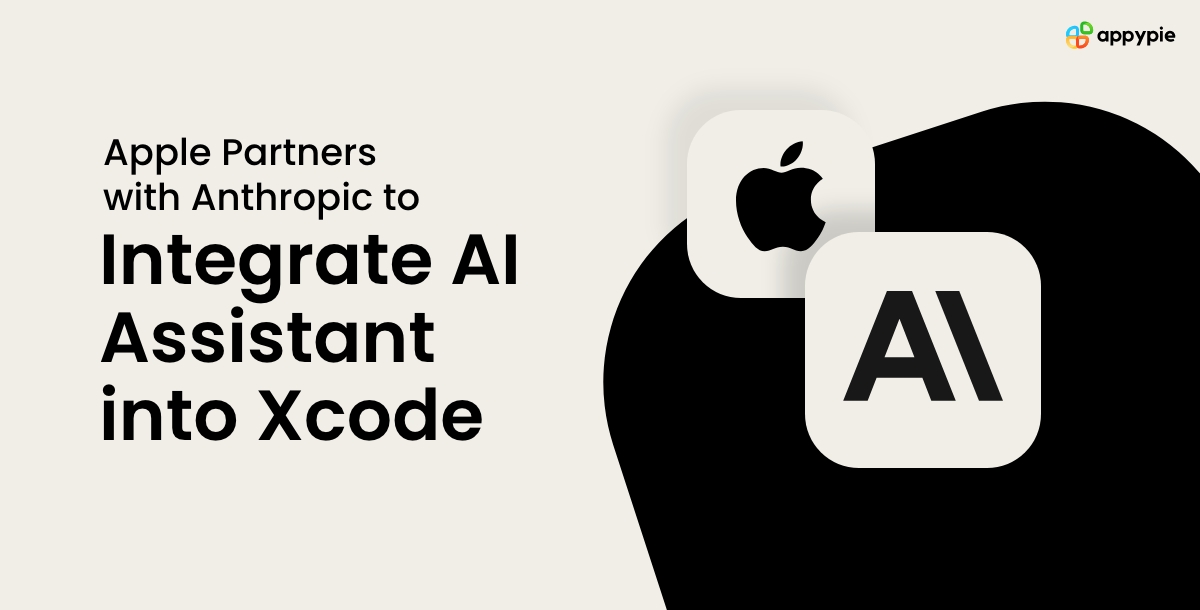Apple Partners with Anthropic to Integrate AI Vibe-Coding Assistant into Xcode

Apple has recently partnered with Anthropic, an artificial intelligence company, to bring new AI features into its Xcode development environment. Xcode is the main tool used by developers to create apps for iPhones, iPads, and other Apple devices. This partnership marks a new step in Apple’s efforts to use artificial intelligence to support and improve the way developers write and test code.
Through this collaboration, Apple aims to make software development faster and more efficient. The AI assistant will be able to help developers by writing code, checking for mistakes, and suggesting changes. These features can reduce the amount of time it takes to build and test apps.
The key takeaway is simple. Apple is now investing in artificial intelligence not just for consumer products, but also to help developers. This move shows that Apple is serious about staying competitive in the growing AI Code Generator space and wants to give its developer community smarter tools to work with.
Suggested Read: Coding vs. Vibe Coding
Background and Context of Apple and Anthropic’s Partnership
Artificial intelligence is becoming a key part of how software is written and maintained. In recent years, several companies have introduced tools that help developers write code faster and with fewer errors.
For example:
- GitHub Copilot is an AI tool developed by GitHub and OpenAI. It assists developers by suggesting lines of code as they type.
- Google’s Codey is another AI assistant designed to help programmers by offering code completions and debugging support.
These tools mark a shift in how software development is done. Developers no longer have to write every line of code manually. Instead, they can rely on AI to handle repetitive tasks, suggest better solutions, and improve overall productivity.
While companies like Microsoft and Google moved quickly in this space, Apple has been more cautious. Historically, Apple has focused on building a tightly controlled ecosystem for developers. Its main software development platform, Xcode, has remained a powerful tool, but it has not included advanced AI features until now.
Apple did explore AI internally through a tool called Swift Assist, which was designed to help developers write code in Swift. However, this tool never made it to public release. It reportedly fell short of Apple’s high-performance standards, and concerns were raised that it might actually slow down development instead of speeding it up.
Now, Apple is taking a new approach by working with an external AI company called Anthropic. Anthropic is known for its large language models, especially a model called Claude Sonnet. This model has strong capabilities in understanding and generating programming code.
By partnering with Anthropic, Apple is bringing proven AI technology into its development tools. This marks a clear step forward in its strategy to keep Xcode relevant in a fast-changing developer landscape.
Suggested Read: How To: Xcode Tutorial for Beginners
Details of Apple and Anthropic’s Partnership
Apple has partnered with Anthropic, an artificial intelligence company, to bring advanced AI features to Xcode. This partnership is focused on improving how developers write and manage code using Apple’s development tools.
The collaboration involves direct integration of Anthropic’s AI technology into Xcode. Apple is not just licensing technology from Anthropic. Instead, it is working closely with the company to build a custom experience for developers who use Apple’s platform. This shows that Apple is taking a more open approach to AI than it has in the past.
At the center of this project is Claude Sonnet, one of Anthropic’s large language models. Claude Sonnet is designed to understand natural language and programming code. It can read, write, and suggest code just like a human developer. Apple is using this model as the foundation for the AI assistant inside Xcode.
Several features are currently being tested internally:
- Code writing: Developers can ask the assistant to write blocks of code based on natural language instructions.
- Code editing: The assistant can help clean up or reformat existing code.
- Bug fixing: Developers can describe a problem, and the assistant can try to identify and correct the issue in the code.
- UI testing: The assistant can also support testing of user interfaces by simulating interactions and checking for errors.
Suggested Read: 5 Quick Tips for the Xcode 11 Minimap
Strategic Rationale of Apple’s AI Code Generation Move
Apple’s move to bring AI into Xcode is timely. As tools like GitHub Copilot gain popularity in AI code generation, developers expect smarter and faster coding support. Apple wants to keep pace and remain competitive, especially with its annual developer event, WWDC, coming up soon.
AI helps developers by:
- Reducing time spent on repetitive coding tasks
- Fixing bugs more efficiently
- Testing user interfaces faster
This improves productivity and keeps developers loyal to Apple’s ecosystem, which supports long-term platform growth.
Apple had earlier tried to launch a tool called Swift Assist, but it was never released due to performance concerns. This time, instead of building from scratch, Apple is partnering with Anthropic to use a tested AI model and avoid past mistakes.
Suggested Read: What is Codex? OpenAI’s Recently Launched AI Coding Agent
Apple’s Xcode AI Assistant: What It Means for Enterprise Software Teams and Developers
Implications for enterprise software development workflows
Apple’s decision to add an AI assistant to Xcode could make a real difference in how software teams work. Xcode is the main tool that developers use to build apps for Apple platforms. By adding AI support, Apple is aiming to simplify routine development tasks.
For enterprise teams, this means:
- Developers may spend less time writing repetitive code.
- Tasks like debugging, testing, and reviewing code might become faster and more consistent.
- Junior developers could complete tasks that usually require more experience, which may help reduce dependency on senior resources.
In large organizations, where teams often manage multiple apps and tight timelines, this kind of automation could lead to smoother workflows and more predictable outcomes.
Potential benefits for developer productivity, cost savings, and time-to-market
When AI is used correctly in development tools, companies often see improvements in three key areas: productivity, costs, and speed. Apple's AI integration aims to bring similar benefits.
- Developer productivity
The assistant can help suggest code, fix errors, and answer technical questions. This allows developers to focus more on solving complex problems rather than doing basic tasks. - Cost savings
By speeding up development and reducing errors early in the process, companies may save money. Fewer bugs mean less time spent fixing issues later on. - Time-to-market
Faster development cycles mean companies can launch updates or new products more quickly. In fast-moving industries, this can provide a competitive edge.
Expected rollout scenarios and ecosystem implications
As of now, Apple is testing this AI assistant internally. However, if early results are successful, the assistant could be made available to all developers using Xcode. Apple may choose to:
- Release the assistant as a built-in feature in future Xcode updates.
- Introduce it in stages, starting with basic features and expanding over time.
- Provide support only for developers working within Apple’s ecosystem to maintain control and security.
If the rollout goes well, we may see deeper integration of AI into other developer tools from Apple. This could make the entire Apple ecosystem more attractive to both individual developers and enterprise teams, especially those looking to modernize their software development processes.
Suggested Read: How To Download, Install and Update Xcode
Suggested Read: What is Vibe Coding? The Future of Software Development
Key Risks and Considerations for Apple’s AI Integration in Xcode
While the integration of AI into Xcode sounds promising, there are a few important concerns that need to be considered.
Data Privacy
Apple is known for its strong focus on user privacy. However, when AI tools handle code, there is a risk of sensitive data being exposed. Even though Anthropic’s model is likely to operate under strict guidelines, any exchange of information with an external partner needs to be carefully managed.
Intellectual Property Ownership
When an AI model writes code, it raises the question of who owns that code. Developers and organizations may need clear policies to ensure there are no legal issues regarding authorship and ownership of the output generated by AI.
AI Reliability and Accuracy
AI code generator tools can make mistakes, especially in complex development tasks. If the assistant suggests incorrect code or fails to catch bugs, it could lead to delays or problems in production. Developers must still review and verify AI-generated code.
Apple’s Walled Garden and Third-Party Integration
Apple traditionally prefers to build and control its own technology. Using an external model like Claude Sonnet might challenge that approach. Apple will need to ensure that the integration is seamless and meets its performance and privacy standards.
Impact on Developer Roles
As AI handles more of the coding tasks, the role of human developers may shift. There could be more focus on reviewing AI work, guiding its output, and working on higher-level architecture. This change may also require developers to learn how to work alongside AI tools effectively.
Suggested Read: Best AI Code Editors in 2025: Revolutionizing the Development Experience
What to Expect Next from Apple’s AI Integration in Xcode
There are a few important areas to keep an eye on in the near future as this partnership develops.
WWDC Announcements in June
Apple is expected to provide more details at its Worldwide Developers Conference. This is usually when new tools and features are introduced. If the AI assistant for Xcode is presented publicly, developers and businesses will get a clearer view of its capabilities and availability.
Apple’s Larger AI Strategy
So far, Apple has moved cautiously in the AI space. This partnership may mark a turning point. If Apple continues to work with other AI companies or expands internal AI capabilities, it could become a more active player in the field.
Possible Expansion Beyond Xcode
While the current focus is on software development, Apple might eventually bring AI into other areas such as design, testing, or even user support. If the AI performs well, it could become a standard part of Apple’s broader ecosystem, touching multiple tools and platforms.
Conclusion
Apple’s partnership with Anthropic to bring AI into Xcode shows that the company is ready to explore more advanced technology in software development. It highlights a shift from Apple’s usual preference for internal solutions toward strategic collaboration.
This move could make life easier for developers by saving time and reducing repetitive tasks. At the same time, it raises new questions about privacy, control, and how developers will adapt to working with AI as their code generator.
If Apple succeeds in this effort, it could set a new standard for how coding is done across its platforms. The full impact will become clearer in the coming months, especially after the company shares more information during its June event.
